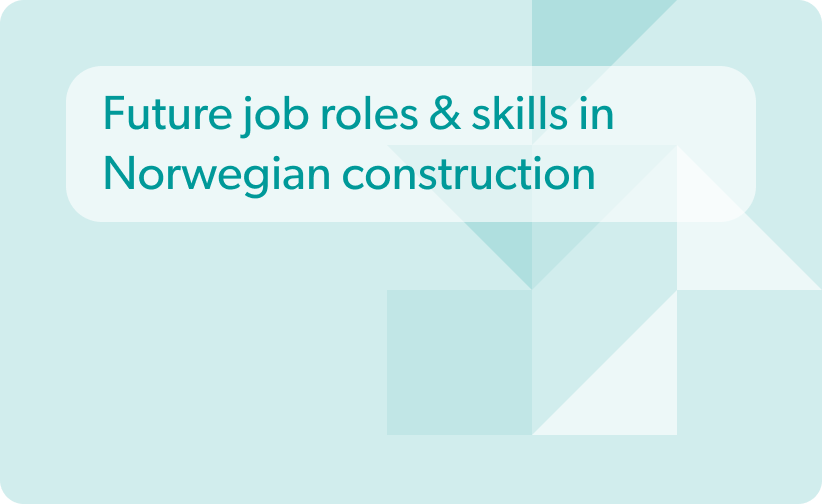Emerging technologies are gradually affecting many areas – how we consume information, do shopping, learn, communicate – and our working environment. While we’re still far from total robotization and futuristic Philip Dick’s sci-fi technologies, some aspects are already infiltrating many job roles and industries. This infiltration might lead to emerging of new job requirements, new skills, and the whole new approach to how we perform our jobs. In this blog post we’re taking a brief look at how technology will change the future of work in different domains.
Pharma and chemical
In this industry, skill requirements and their complexity are changing rapidly. This is just one of the key findings of the Future Chemie Report, which we’ve released this year together with IG BCE and BAVC.
On the global scale, new technologies related to automation and robotics, material sciences, 3D printing, IoT and connectivity, alterative feedstock, virtual reality, cybersecurity, Big Data, biotechnologies, machine learning, and AI, have already been pushing the pharma and chemical industry towards the curve.
Apparently, adoption of emerging technologies differs for different countries. For instance:
- The US leads the demand for talents that have data science and analytics skills, knowledge of machine learning and AI, and hands-on Big Data technologies.
- China focuses on professionals demonstrating material sciences skills.
- German chemical industry, in turn, is well-positioned in regard with such trending skills as automation and robotics, 3D printing and additive manufacturing,
Here’s the global overview of the top jobs and skills of the chemical and pharmaceutical industry:
source: HRForecast database, 2021
The aim of emerging technologies is not purely automation and digitalization, though. Just a few cases, how technologies can change the future of work in pharma and chemical industry include:
- Prevention, early detection, and interventions in the earliest stages possible due to data analytics, machine learning, and algorithms
- Medical intervention enabled by robotics, nanotechnology, or tissue engineering
- Customized and curative treatments driven by data-powered insights
- Digital therapeutics for nonpharmaceutical interventions powered by a blend of human and AI capabilities
Chemical industry: future skills
Which skills will be crucial for the chemical industry in the upcoming years? Find out in this report based on 200k+ job postings analysis.
Oil and gas industry
Oil and gas is another industry that faces a remarkable shift in its workforce. Companies in this domain have already started using technology to increase optimization and reduce production costs, but what impact will this efficiency-driven change have on the industry, organizations, employees, and future of work?
So far, the main engine of progress in the oil and gas domain has been automation and AI. According to EY research Rethinking the oil and gas workforce in 2040 exploring oil and gas in Canada, competencies that with the highest probability will be automated in the next 20 years include:
- Production and processing
- Transportation
- Customer and personal service
- Preventative maintenance
- Managing finances
- Operation and control
- Operation monitoring
Most jobs, that will face automation, relate to drilling and facility operations, marine and nautical, technician, equipment, and geology areas. Apparently, the same areas will see the most significant workforce reduction by 60-65%.
On the bright side, implementation of automation and other new technologies might increase the industry’s appeal to future tech-savvy employees, help companies attract – and grow internally – a highly skilled and educated workforce. Among other roles, the oil and gas industry will hunt for data scientists and software developers.
Mining and metals
The pace of change towards future of work is also accelerating in the mining and metals industry. Companies in this domain are primarily focused on adopting robotics, IoT & connected devices, and Big Data analytics.
Roles that will get increasingly demanded in the next four years include:
- AI and machine learning specialists
- Data analysts and scientists
- Process automation specialists
- Robotics engineers
- Software and applications developers
- Digital transformation specialists
- Remote sensing specialists and technologists
- Management and organization analysts
- IoT specialists
- Big Data specialists
Automation and ‘thinking machines’ indeed might replace human tasks, jobs and require new skills. In our recent interview, Angelika Kambeck, who’s been an HR executive in the mining and metals industry for more than a decade, confirms this assumption:
“Now it’s becoming more evident that the tasks and jobs will change. I think three or four years ago, people were not taking that seriously, but now it’s been a reality for a longer time. I realized so far that not the jobs will totally change but rather tasks within the jobs.”
This, in turn, will entail the need to invest in employees development. As WEF has shared in their recent report, a whopping 73% of companies identified skills gaps in the local labor market as the most significant barrier to adopting new technology. With this in mind, companies need to come up with upskilling and reskilling initiatives to boost their existing workforce tech literacy. This will also help companies keep up with the external labor market to win the rising talent stars.
Close skill gaps
Spot and address skill gaps and identify critical skills in your organization with smartPeople – a skill management platform
Automotive
Automation is hardly new in the global automotive industry. But the emergence of increasingly sophisticated cognitive technologies and machine control could increase significantly. Besides, stretching towards in-car connectivity and smart cities (perhaps sci-fi reality is not as far, eh?) will nurture the growth of:
- data
- networks
- software
- and services
The growth of these notions will strengthen the demand for highly skilled and tech-savvy engineers as well as data, software, and cybersecurity professionals.
Construction
In addition to hammers and nails, VR headsets and 3D printing might become new tools employees will need for construction. Other emerging technologies that will shape the future of work in this domain include:
- Robotics
- Wearable tech
- Machine learning
- Cloud technologies
Virtual and augmented reality enable designers and builders to connect and collaborate on their projects in real-time. Also, the role of digital construction — that allows to cut time, money, and material — will grow and let design, build and operate projects with 3D models before they ever take shape in the physical world.
Besides, along with VR, wearable tech is set to become a big construction trend. With wearable tech, employees can access automated data collection from the site, make measurements, identify GPS coordinates and connect all the data to their project management software.
Machine learning will allow professionals to get insights from construction data collected at sites, while Big Data can be used to make more informed decisions, prioritize and manage risks to budget, time and employee safety.
Using robotics on-site is also becoming increasingly popular. Robotics can increase safety, accuracy and efficiency whilst having the added benefit of being able to gather information for survey data.
Retail
The retail industry is so extensive that its evolution, and particularly the evolution of retail jobs, might have an impact on a national level. For instance, retail is the largest private employer in the UK, with close to 4 million workers, which is about 14% of the nation’s employees.
New technologies that might disrupt this domain will primarily relate to automation, which impact will differ across different job groups:
- For store jobs (including managers, sales assistants, cashiers, and shelf fillers) automation will address repetitive tasks like checkout or changing price labels, freeing up time for customer service
- Supply-chain jobs (warehouse roles, roles that involve planning, managing, and organizing supplies) will consider automatable manual tasks as well as dealing with software and data analytics
- White-collar jobs (book-keepers, payroll managers and wages clerks) will feel a heavier impact from automation and might be displaced
Like other industries, demand for technical professionals will skyrocket in retail, especially for software developers and IT professionals with hands-on design, deployment, and maintenance of automation technologies in stores.
Final thoughts
It’s impossible to squeeze all the industries and domains into this overview. Yet, we hope you got the picture in broad strokes: the change driven by emerging technologies is irreversible. It’s similar to the ocean wave: we can’t stop it, we can’t resist it – but we can embrace it and move along with it.
If you want to get more insights into the future of the workforce, check out our recent article: How to prepare for the future of the workforce in 2030: key trends and strategies.
Stay up to date with our newsletter
Every month, we’ll send you a curated newsletter with our updates and the latest industry news.




























 info@hrforecast.de
info@hrforecast.de
 +49 89 215384810
+49 89 215384810






